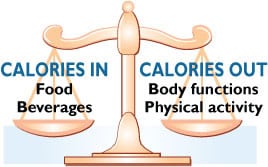
Hey everyone! Good to be back on here after a year's break! Some of you might have read this article a couple of years ago, but since then I have learnt some important factors which affect weight gain. Therefore, I will discount my previous message 'eat less and move more'. Let's have a look at the why this model is wrong and what are the best solutions....

Why this model does not work
Many of us have been told that if we eat less, and exercise more we will burn more energy and subsequently lose weight. For some, this has worked for a short time because we have succeeded at reducing the energy the body needs at rest (BMR). However, this has only lasted for short period and we have been taught this is due to lack of will - power.
I have some good news, obesity is a hormonal issue not simply psycho-social. Here's the truth, hormones control how much energy we consume and how much energy we burn. If we eat less, we will burn less regardless of the amount of activity we do. Another important note, calories are not equal, therefore each nutrient will affect our metabolism differently.
Some quick science, insulin is released from the pancreas (pictured above) and has two key functions. These include storing fat and using our blood sugars (glucose) as stored energy. I'm sure most of you are now thinking ''insulin is making me gain weight'', if this is the case, you're on the right lines. Each type of food we eat, carbs, protein and fat have a different effect on our insulin.
Fat has no effect because it is not absorbed in the blood stream, but lymphatic system. Protein has little effect on insulin, however, carbs raises our insulin. The more refined and processed carbs we eat, the higher our blood sugars and the higher our insulin rise in the blood stream. Too much blood sugars causes insulin resistance because insulin is unable to convert excess glucose into energy and is converted to fats known as triglycerides. When this happens, the body is now in fat storage mode.
So what's the solution?
You need to work towards reducing our insulin and blood sugars. The only way we can achieve this is by reducing the amount of carbs in our diet, fasting and possibly increasing our physical activity. You can follow a low carbohydrate diet (50g>130g carbs, SACN, 2015), this will reduce insulin resistance and place our body in fat burning mode because insulin is not being used, so fat will be the main source of energy. This is the same for fasting. Physical activity helps insulin to convert our glucose to energy in our active muscle cells, so again, no insulin resistance.
So what's the best type of physical activity?
- Any type of movement that keeps you warm and raises your heart rate slightly, e.g. brisk walking
- Aim for 30 minutes of moderate activity 5 x week, where possible
- Make sure it is something you enjoy, otherwise you're less likely to stick with it
- Aim for muscle - strengthening exercises, twice a week, e.g. swimming or resistance training
Soph's Nutrition Tips
- Aim for carb reduction, not calorie reduction
- Aim for at least 30 minutes of physical activity a day
- Aim for more fibre in your diet, e.g. pulses and nuts
- Have more plant - based vegetables and less fruit
- Consider intermittent fasting
Thank you very much for taking the time to read my blog, next content will be a surprise!
Soph x




